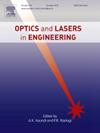Foreground-background separation and deblurring super-resolution method
IF 3.5
2区 工程技术
Q2 OPTICS
引用次数: 0
Abstract
The limited depth of field (DOF) inherent in cameras often results in defocused and blurry backgrounds when capturing images in large aperture mode. This not only leads to the loss of crucial background information but also impedes the efficient reconstruction of the background regions. Usually, super-resolution (SR) techniques struggle to produce high-quality results for images captured with large apertures. To enhance the reconstruction quality of defocused regions in large aperture images, a foreground-background separation and deblurring super-resolution (FBSDSR) method was proposed in this paper. Based on the idea of foreground-background separation processing, we first divide the large aperture image into a sharp foreground region (If) and a blurry background region (Ib) based on depth information. The background region (Ib) is then deblurred using an end-to-end iterative filter adaptive network (IFAN). This deblurring process refocuses the background, ultimately restoring an image with sharp details throughout. Finally, the enhanced super-resolution generative adversarial networks (Real-ESRGAN) which specializes in images SR of realistic scenes was used to process the sharp all-in-focus image. This method results in high-quality reconstructions of both the foreground and background of large aperture images. The experimental results demonstrated that the proposed method achieved effective reconstruction of the entire large aperture images clearly, overcoming the limitations of existing methods that struggle to reconstruct defocused regions. This significantly enhances the quality and resolution of large aperture images. Specifically, when FBSDSR is integrated with Real-ESRGAN, the PSNR, LPIPS, NIQE, and hyperIQA metrics were improved by approximately 2.2 %, 45.1 %, 34.7 %, and 10.9 % respectively.
前景-背景分离和去模糊超分辨率方法
在大光圈模式下拍摄图像时,相机固有的有限景深(DOF)往往会导致背景虚焦和模糊。这不仅会导致关键背景信息丢失,还会妨碍背景区域的有效重建。通常,超分辨率(SR)技术很难为大光圈拍摄的图像生成高质量的结果。为了提高大光圈图像中散焦区域的重建质量,本文提出了一种前景-背景分离和去毛刺超分辨率(FBSDSR)方法。基于前景-背景分离处理的思想,我们首先根据深度信息将大光圈图像划分为锐利的前景区域(If)和模糊的背景区域(Ib)。然后使用端到端迭代滤波自适应网络(IFAN)对背景区域(Ib)进行去模糊处理。去模糊过程会对背景重新聚焦,最终还原出整体细节清晰的图像。最后,增强型超分辨率生成对抗网络(Real-ESRGAN)被用来处理锐利的全聚焦图像。这种方法可以高质量地重建大光圈图像的前景和背景。实验结果表明,所提出的方法能有效、清晰地重建整个大光圈图像,克服了现有方法难以重建散焦区域的局限性。这大大提高了大光圈图像的质量和分辨率。具体来说,当 FBSDSR 与 Real-ESRGAN 集成时,PSNR、LPIPS、NIQE 和 hyperIQA 指标分别提高了约 2.2%、45.1%、34.7% 和 10.9%。
本文章由计算机程序翻译,如有差异,请以英文原文为准。
求助全文
约1分钟内获得全文
求助全文
来源期刊

Optics and Lasers in Engineering
工程技术-光学
CiteScore
8.90
自引率
8.70%
发文量
384
审稿时长
42 days
期刊介绍:
Optics and Lasers in Engineering aims at providing an international forum for the interchange of information on the development of optical techniques and laser technology in engineering. Emphasis is placed on contributions targeted at the practical use of methods and devices, the development and enhancement of solutions and new theoretical concepts for experimental methods.
Optics and Lasers in Engineering reflects the main areas in which optical methods are being used and developed for an engineering environment. Manuscripts should offer clear evidence of novelty and significance. Papers focusing on parameter optimization or computational issues are not suitable. Similarly, papers focussed on an application rather than the optical method fall outside the journal''s scope. The scope of the journal is defined to include the following:
-Optical Metrology-
Optical Methods for 3D visualization and virtual engineering-
Optical Techniques for Microsystems-
Imaging, Microscopy and Adaptive Optics-
Computational Imaging-
Laser methods in manufacturing-
Integrated optical and photonic sensors-
Optics and Photonics in Life Science-
Hyperspectral and spectroscopic methods-
Infrared and Terahertz techniques
 求助内容:
求助内容: 应助结果提醒方式:
应助结果提醒方式:


